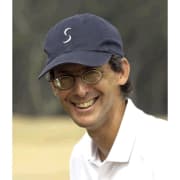A sign of times for PGA Tour at Travelers

CROMWELL, Conn. – Normally, the 25-mile drive from my house to TPC River Highlands, site of this week’s PGA Tour Travelers Championship, is marked by dozens of signs directing spectators to the tournament: alternate routes, exit ramps and parking lots are marked miles in advance. Not this time, based upon a drive that I made Friday afternoon.
The first – and only – sign I spotted along the way came eight-tenths of a mile from the clubhouse, where a marker indicated a need to decide between turning left for the clubhouse or proceeding ahead for parking. That was it. But such is the nature of the quiet that has descended upon the sports world and Connecticut this strange year, when the coronavirus pandemic has altered all normal activity. One of the PGA Tour’s oldest continuous and best-attended golf events, dating to 1952, has to take place in a sanitized bubble.
There normally would be close to a quarter of a million spectators converging onsite during tournament week. That makes it New England’s second-largest-attended sporting event, behind only the Boston Marathon.
To accommodate such a crowd, vast stands would line the closing holes, and an army of carpenters, food-service personnel, electricians, air-conditioning specialists and volunteers would be needed to serve them. Many of them would be buzzing about the site on the Friday before the tournament. Not this year. With no spectators, no stands and hardly any evidence of an impending event other than scoreboards, TV platforms and roped-off fairways, the site was quiet. Almost as quiet as it will be when the field starts arriving Monday for the tournament, which begins Thursday. On the road in, 80 acres of parking usually is roped, lined and filled with signage. This year, there was nothing but a covering of weed crop.
The amphitheater setting around the 18th hole alone would draw 20,000 spectators. If you want to know how loud and exciting such a crowd can be, just flash back to 2017, when Jordan Spieth holed a bunker shot on the first playoff to beat Daniel Berger. The place exploded with a roar.
This is a good sports state, though one that’s been starved of late. The National Hockey League’s Whalers are long gone, as are hopes of luring the New England Patriots from Foxboro, Mass., with promises of a downtown Hartford football stadium. The ballpark that was built, 40,000-seat Pratt & Whitney Stadium at Rentschler Field in East Hartford, barely reaches half-capacity for UConn football and often has trouble filling the lower bowl, with the upper bowl often closed. The UConn men’s basketball team’s four national titles are a thing of the past. One unqualified sports success is the UConn women’s basketball program, with 11 national titles in the past 25 years. Another welcome surprise has been the fan base of the Hartford Yard Goats, a Class AA affiliate of the Colorado Rockies. During the past two years, you’d have been hard-pressed to find an empty seat in downtown Hartford’s 6,100-seat Dunkin’ Donuts Park.
This year’s Travelers will have its strongest field ever. Nine of the top 10-ranked players in the world have committed – all but No. 8 Adam Scott. The field includes 109 players who have won on the PGA Tour. Tournament director Nathan Grube says that at one point, there was talk of postponing the event entirely, but the decision was made to go ahead because of the need to make a statement to the community.
“Sponsors have responded generously,” he said. That raises hopes that tournament organizers should be able to make something approximating a normal donation to area charities from the net proceeds.
Impressive, despite the lack of the kind of onsite excitement that typically turns Wednesday’s pro-am into a celebration of New England sports. With ESPN’s headquarters nearby in Bristol and the cable channel’s personalities a major part of the sports scene, the event normally feels like a festive gathering of the sports and business communities. All that will be missing, along with gala events and charity gatherings that normally take place across town.
Grube, who always looks forward with optimism and organizational commitment, simply sees this year’s event as a step toward next year’s. “With all that we’re doing this year,” he said, “can you imagine the excitement for 2021?”
This year’s Travelers Championship comes just as Connecticut is starting to emerge from a virtual shutdown. The state’s death rate was three times the national average. The toll was highest in the state’s richest corner, Fairfield County, as well as in poor inner cities, of which Connecticut has an abundance in Hartford, New Haven and Bridgeport.
There’s no hiding from the pandemic. News on June 19 that the PGA Tour’s Nick Watney withdraw from the RBC Heritage event on Hilton Head Island, S.C., merely heightened the need for the kind of precautions that the Travelers has been taking all along.
The host course, TPC River Highlands, over the years has matured in look from a stark lunar layout to mature parkland that now is part of a leafy residential community. Even here, however, there’s no escaping the whirl of events around us. On the half-mile stretch of State Route 99 in Cromwell that forms the approach to the golf course, there are a dozen lawn signs that homeowners have posted. Half of them read “Thank You Essential Workers.” The others read “Black Lives Matter.”
Sign up to receive the Morning Read newsletter, along with Where To Golf Next and The Equipment Insider.
